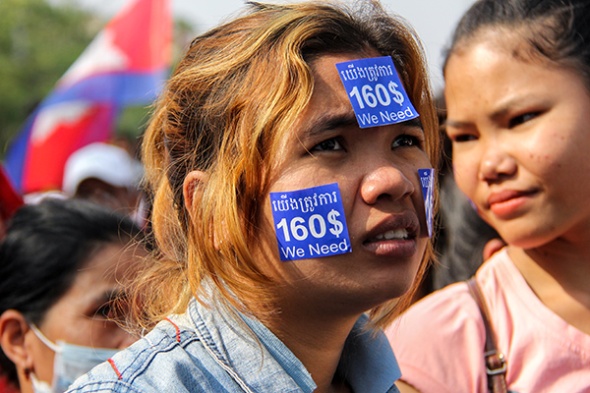
Defending Democracy: A New Approach for Apparel Industry Supply Chains
Date: March 2023
Author(s): Judy Gearhart
Publication type: Blog
Published by: Sourcing Journal
Note: This blog was originally published by Sourcing Journal on 20 March 2023.
As the U.S. prepares to host the second Summit for Democracy on March 29-30, it’s a good time to evaluate the ways U.S. multinational corporations (MNCs) can impact democratic spaces around the world. The Biden Administration has recognized the importance of broad civic freedoms and the role of trade unions through the Multilateral Partnership for Organizing Worker Empowerment, and Rights (M-POWER). Now it needs policies that incentivize corporations to engage meaningfully with national trade unions and NGOs advocating for workers in their supply chains.
Business and human rights discussions frequently focus on MNCs’ supply chain monitoring efforts or the need for supplier governments to reform their laws, but neither can work without social movements on the ground to provide a counterbalance and a check on those initiatives. Having spent decades supporting worker organizers in Latin American and Asian export industries, I recently took a deeper look at how they leverage supply chain campaigns to advance their priorities.
In “Local Voices, Global Action: Transnational Organizing in Apparel Supply Chains,” I drew on a series of deep-dive interviews with Kalpona Akter from the Bangladesh Center for Worker Solidarity (BCWS) and Tola Moeun from the Center for Alliance of Labor and Human Rights (CENTRAL) in Cambodia, as well as dozens of other apparel worker advocates. By tracing the transnational organizing that enabled breakthrough agreements in the apparel industry, the report illustrates how worker-driven, enforceable agreements have proven effective compliance drivers and could also foster ongoing social dialogue—a critical ingredient to the practice of democracy.
U.S. apparel brands and retailers have stood up to authoritarian regimes on multiple occasions, withholding business from a repressive regime in Uzbekistan or writing letters advocating stronger labor laws in Cambodia. Although positive, these initiatives need to become systemic, corporate practices across multiple industries. Currently, investor demands for continually increasing profit margins drive MNCs’ perpetual search for lower-priced goods, which triggers a repressive cycle. Supplier country governments courting international business prioritize maintaining labor peace, often restricting independent union organizing as well as political reformers that may challenge the government’s approach.
A growing number of European laws require companies to conduct human rights due diligence (HRDD) to identify and mitigate the human rights risks in their supply chains but these laws are largely driving more business towards social auditors and voluntary certification programs. HRDD needs to look beyond factory inspections and include an analysis of how the legal environment enables—or disables—workers’ rights. Without addressing that environment, corporate compliance programs are like a dog chasing its tail; no matter how they stretch to improve audits, there’s always a larger force pulling away workers’ rights.
If companies want to address closing civic space in a meaningful way, they need to consider how they engage and negotiate with worker organizations and their representatives. Refusing to negotiate solutions with independent trade union representatives effectively echoes the national business and political leaders that would like them silenced. HRDD cannot be a one-off process. It needs to be an ongoing effort, to engage in dialogue with independent trade unions and organizations like CENTRAL and BCWS to address systemic problems and crises, like the pandemic, when they emerge.
More effective corporate accountability requires three elements: corporations committed to the rule of law, effective regulatory incentives, and free and independent trade unions able to monitor and support workers’ access to remedy. U.S. MNCs that engage in dialogue with international and independent trade unions—through worker-driven agreements such as the Bangladesh Accord, the Dindigul Agreement in India, or the Lesotho Agreement—will signal the importance of these worker advocates and be able to address problems as they arise.
Current efforts to revise the U.S. National Action Plan for business and human rights is a critical opportunity to create incentives for U.S. MNCs to level up their respect for and engagement with trade unions and worker advocates. The U.S. has powerful trade laws such as the Tariff Act to hold up goods at port made with forced labor or the Global Magnitsky Act to punish corrupt suppliers. These laws create indirect pressure on brands and retailers to monitor their supply chains, but they stop short of requiring due diligence and reporting. Greater transparency requirements and incentives for U.S. MNC commitments to worker-driven agreements would reward those companies going beyond factory monitoring to address the root causes of rights violations.
Well-known brands and retailers are de facto American emissaries when they do business abroad. Their potential to foster meaningful and ongoing dialogue with worker advocates remains largely untapped but could prove essential to building and preserving democratic space.
Judy Gearhart has advocated for workers’ rights in the apparel industry as an organizer in Mexico, a policy analyst, and an international campaigner. She currently serves as a research professor developing ARC’s programs on corporate accountability and workers’ rights. In 2021, she piloted a podcast series, The Labor Link, which features some of the interviews used in this paper. Gearhart has also been an adjunct professor at Columbia University since 2001, co-teaching the class Human Rights and the Politics of Inequality. Previously, she served as the executive director at the International Labor Rights Forum and as the program director at Social Accountability International. She also worked in Mexico and Honduras for national NGOs, UNICEF, and the ILO. Her writing, public speaking, and advocacy work has been cited or appeared in major news outlets, including CNN, NPR, the New York Times, and the Washington Post, and has covered a range of human rights and economic justice issues, including women’s rights, trade policy, labor rights, and democratic participation.
